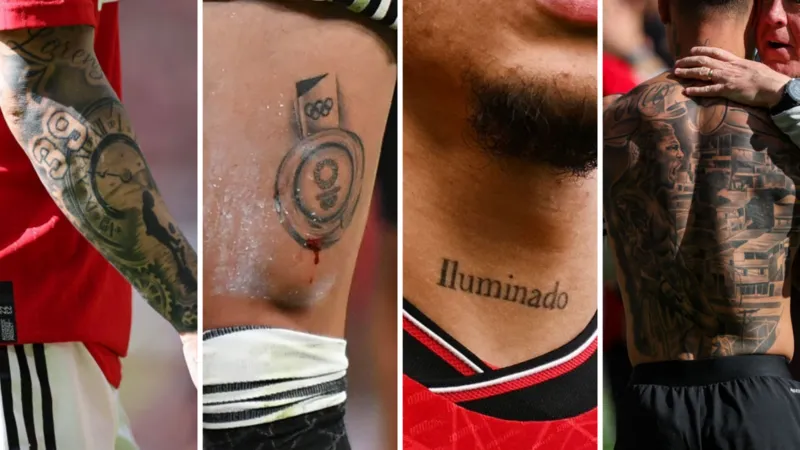The Manchester United winger Antony has given an explanation for why those who berate his football skills won’t “write my story” because of his difficult Brazilian childhood.
When United paid Ajax £82 million for Antony in 2022, he became the second-most expensive player in United’s history, after France World Cup winner Paul Pogba.
In 54 Premier League games, the 24-year-old has only managed to score five goals and earn three assists, hardly making up for that high price.
Antony started the previous season on the bench and did not play in the Wembley FA Cup final 2-1 triumph against Manchester City in May.
However, he provided a candid look into his difficult upbringing in a Sao Paulo favela that not all of his pals were fortunate enough to escape from on the eve of this weekend’s Community Shield rematch between the Manchester derby. Responding in his native Portuguese to questions in English, Antony told reporters, “It’s difficult for me to talk about my background.” Not by accident, I play with the word ‘favela’ printed on my boots and have the favela where I grew up tattooed on my back. I’m never alone in the favela. I actually know what it’s like to be at the bottom, therefore I’ll never let anybody else write my tale or allow anyone to tear me down.
“There were times when I didn’t have boots to play football in, times when there wasn’t enough to eat. I didn’t have a bedroom – I slept on the sofa in the living room. My house would flood when it rained heavily.
“I saw a lot of friends go down another path and some of them lost their lives. I know what I went through; I know what my mother, father, brother and sister suffered together with me.”
Favela is the term used for densely populated areas on the outskirts of Brazilian cities, likened to slums or shanty towns. They are characterised by lower life expectancy, higher infant mortality rates, lack of education and low literacy levels.
It is estimated about 6% of Brazil’s population, more than 11 million people, live in favelas.

Some of Antony’s tattoos, including an image on his back of the favela where he grew up and which he spoke about to the media
Despite now having the wealth that allowed him and his immediate family to leave the favelas, Antony said he still goes back, because it represents his roots.
“My parents, brother and sister don’t live there any more, but whenever I’m on holiday I always look to pay a visit, even if it’s for a short amount of time,” he said.
“It renews my energy, reminds me where I come from and everything I went through to get here. I always get emotional talking about the favela because it’s somewhere I learned so much through adversity. We had nothing, just our faith in God and determination.”
Despite the language barrier and presence of an interpreter, Antony was emotional and close to tears as he discussed his early life and preconceptions of wealthy footballers with British journalists.
“A lot of people don’t see where you come from and what you’ve overcome,” he said. “You come from nothing, from not having enough to eat, and now have practically everything with such ease – it’s difficult to deal with this. I will always represent the favela. It is there, with me, for the rest of my life.”
Antony accepts his performances for United have not been good enough.
He remains under investigation in Brazil and England over allegations of domestic abuse made against him by three women, although he has not been arrested or charged in either Brazil or the UK, and denies the allegations.
Antony said the investigation affected his form.
“I demand a lot of myself and obviously I was not satisfied with my season,” he said. “A lot happened over the year in my personal life. Like it or not, everything had an effect on the pitch.
“But I’ve got a strong mentality and I’m focused on what I want. I know this season will be totally different.”
Although United manager Erik ten Hag has continued to defend a player he first got to know at Ajax – where Antony moved from Sao Paulo as a teenager in 2020 – the Dutchman appeared to begin the process of easing out the winger at the end of last season.
With Jadon Sancho readmitted to the first-team squad, the emergence of Amad Diallo, Marcus Rashford earmarked for a wide role and Alejandro Garnacho’s domestic form propelling him into Argentina’s victorious Copa America squad this summer, it is clear Antony faces a major battle trying to establish himself at Old Trafford.
Whether it pays off or not is another matter, but Antony is being diligent about trying to improve his performance, to the extent he now keeps handwritten notes on every match he plays to highlight areas where he has done well and what he can do better.
“I always set out objectives,” he said. “More goal participations, more assists, where I need to improve. I put them down on paper rather than on my phone.
“For every game I need to put something in writing – goals, shots on goals, dribbling, everything. I have to do it for every game and am doing it in training as well.
“It’s really important for me. It allows me to visualise and mentalise and then step on to the pitch with this in mind.
“I usually take the notes with me but if I leave them at home, I’ll ask my wife to send me a photo of them. I’m always reflecting – about how many shots I should be making in a game, that I can’t lose the ball, that I need to score goals and create assists, pass and dribble completions as well as defensive performance.
“I have a lot of objectives.”
